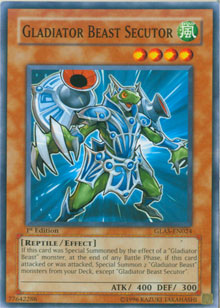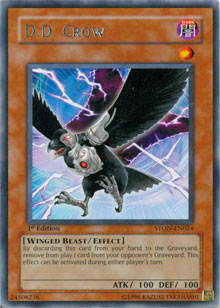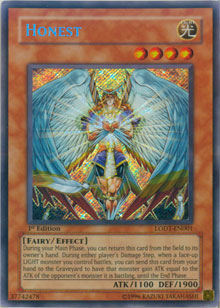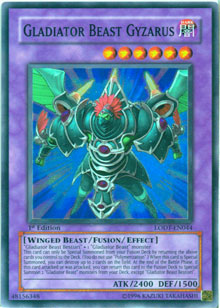Studying the Yu-Gi-Oh! Trading Card Game for my purposes as a writer is one of the most fun tasks I’ve ever been assigned. My job is to bring you (the readers) insight into top decks and playing techniques through both of my columns. In the Champions I break down decks, and in Battlefields I talk more about play styles. My original fear with the Battlefields column was a lack of new material. I was worried I’d burn myself out too quickly and the column would become redundant. Thankfully my continued study of the game has helped me keep material fresh.
Today I'm going to talk about a technique that’s only recently come into play. The reason it has done so is because of the nature of cards that are available to the general public right now as well as the number  of Gladiator Beasts that are being run. Gladiator Beasts thrive off of making attacks to generate effects. Those effects lead to either more monsters (which in turn lead to more attacks or bigger monsters) or the destruction of cards. Gladiator Beast Murmillo and Gladiator Beast Bestiari provide direct paths to destruction while Gladiator Beast Gyzarus allows for another route via Gladiator Beast Darius or Gladiator Beast Secutor.
of Gladiator Beasts that are being run. Gladiator Beasts thrive off of making attacks to generate effects. Those effects lead to either more monsters (which in turn lead to more attacks or bigger monsters) or the destruction of cards. Gladiator Beast Murmillo and Gladiator Beast Bestiari provide direct paths to destruction while Gladiator Beast Gyzarus allows for another route via Gladiator Beast Darius or Gladiator Beast Secutor.
Dark Armed Return, on the other hand, is always looking for a way to end the game. This particular archetype would like nothing more than to just drop three copies of Dark Armed Dragon, destroy your field, and attack for over 8400 damage. Since that’s not always going to happen, Dark Armed players instead are looking to end games by keeping their Dragons on the field, protecting them so they can destroy opposing defenses and make enough direct attacks to win.
Since both archetypes revolve heavily around making attacks on back-to-back turns, plenty of cards in the format are geared toward making sure that can happen. With these cards everywhere, a new technique has evolved. I call it "freezing," or "locking" the opponent up. Here’s how it works: in a simplified game state, you play into a position where your opponent is going to have a turn that does nothing to advance his or her position, and then a turn afterward where the opponent can’t make any plays. This means your opponent is not fighting back for two turns. The amount of damage a Gladiator Beast or Dark Armed deck can do in that time is usually insurmountable. With enough Gladiator Beasts in the graveyard, Gladiators can quickly pump out Gladiator Beast Gyzarus and Gladiator Beast Heraklinos like they were nothing, and with Dark Armed Dragon on the field, doing nothing is simply not an option.
Freezing sounds harder than it actually is. Paralyzing an opponent on his or her turn is really the hardest part, but once you’ve achieved that, it’s simply a matter of setting up so completely that your opponent can’t make any healthy moves on that player’s next turn. You don’t have to freeze the opponent right away. If he or she has a way out, you simply have to out-answer him or her. The player who runs out of answers first loses, because then that player can only set defenses and hope to draw a way out. At that point you’re multiplying Gladiators or pushing heavily with Dark Armed Dragon and pals.
So back to achieving the lock. Freezing is not something you’ll be able to do every game. Yu-Gi-Oh! is very much a "right card, right time" game. That is to say it’s a game of circumstance, where you’re rarely going to be in the exact same situation twice. Chances are that you or your opponent are going to have something different every time, and you won’t be able to make the same plays every match. Freezing is a technique you should attempt only when you draw the perfect cards for it. However, if done successfully, freezing will easily win you duels.
Cards that will help you freeze your opponent are Trap Dustshoot, Solemn Judgment, D.D. Crow, and Mind Crush. Cards that will almost single-handedly freeze your opponent are Cold Wave,  , and Crush Card Virus. The reason is that these cards can break up your opponent’s plays, preventing an answer from happening and allowing you to advance your game position next turn to one that can’t be answered.
, and Crush Card Virus. The reason is that these cards can break up your opponent’s plays, preventing an answer from happening and allowing you to advance your game position next turn to one that can’t be answered.
When you have any three of these cards in a Gladiator Beast or Dark Armed deck along with some powerful monsters, I’d suggest going for a freeze. Here’s how you do it: get yourself into a position where you have the potential to make a big play next turn. From there, wait until you can spring a trap on your opponent that leaves him or her stranded. In other words, shut the opponent’s play down halfway through it. The opponent should then have to pass with a silly looking field—something like an attack-mode Gladiator Beast Murmillo or Dark Grepher that was supposed to be supported but is now helpless on the field. With Gladiator Beasts you can take advantage of this, and if you’ve set it up properly, you can tag out for a monster that breaks up what your opponent has left.
The reason the aforementioned cards are so good at creating a freeze is because they do a lot to advance your position while preventing your opponent from drawing or using his or her own answer. Cold Wave is pretty self explanatory, as your opponent can’t answer your Gyzarus or Dark Armed Dragon effects and then can’t use spell or trap cards to answer them next turn either. Crush Card Virus can achieve the same effect by leaving your opponent with no playable monsters. Phoenix Wing Wind Blast is the real gem though.
Wind Blast is the perfect card for a tricky player, as its chainability and the fact that it can target anything the opponent controls means you can use it at the perfect time to break up whatever your opponent is trying to do. You know the card your opponent is about to draw to boot. Picture using Crush Card Virus to reveal your opponent’s hand and then using Wind Blast to send back a revived Gladiator Beast Bestiari to the top of his or her deck. You know your opponent’s going to draw a card that will be discarded, and he or she has no way of dealing with monsters in hand. So you make your Gyzarus tags for two copies of Gladiator Beast Laquari, knowing that you can connect for 4200 next turn. Then you get to see your opponent’s last top deck and act accordingly.
Things always sound less complicated when you talk in practical terms, so let me give you two examples from my play experience at the most recent Shonen Jump in Philly. I played my own Gladiator Beast deck  there and went 8-2, finishing 23rd. I was not disappointed with my performance, since my two losses were to Gladiator Beast decks and came as a result of my own poor side deck. Two of my wins came when I froze my opponent and instantly capitalized on the opening.
there and went 8-2, finishing 23rd. I was not disappointed with my performance, since my two losses were to Gladiator Beast decks and came as a result of my own poor side deck. Two of my wins came when I froze my opponent and instantly capitalized on the opening.
In one of the earlier rounds, I was paired up against a Counter Fairy deck. Knowing the importance of Bountiful Artemis, I was stunned to see my opponent simply summon the Artemis and set only one spell or trap card before passing. I figured he either held multiple copies of Artemis or had Honest, a means to protect Artemis from the hand. After my Dust Tornado revealed his face-down card would do nothing against my attacking monsters I knew my read on Honest to be true. He knew I was playing Gladiator Beasts and would lose out big time to Gladiator Beast Laquari or Darius, tagging out for Gladiator Beast Bestiari. I knew from our first game that he was in fact a good player, and banked on that when making my read.
I also knew because of the deck he was playing that he did not have any way to stop Heavy Storm or Gladiator Beast Gyzarus. He would have set them with the Artemis on field to try to bait out those cards, negate them, and draw with Artemis’s effect. He clearly had a weak hand, and my hand was relatively good: the perfect time to try and freeze him. What I did was flip Mind Crush calling Honest (allowing me to discard his protection for Artemis), destroy Artemis in battle, and tag out for next turn. I made a tag out for a bigger Gladiator Beast Hoplomus in defense mode, as I was holding Elemental Hero Prisma in hand. He was unable to make any plays thanks to my defending Hoplomus and simply set a spell or trap and a monster.
Next turn, Prisma came down and did its thing, and Gladiator Beast Gyzarus was introduced to the match. Sure enough, Gyzarus went through, and after some quick Gladiator multiplying, I was left with Gladiator Beast Bestiari, Gladiator Beast Darius, and Gladiator Beast Laquari. My opponent was frozen. Since he  couldn’t deal with a 2400 defender he was now staring down a potential Gladiator Beast Gyzarus for next turn. With one Book of Moon I would be able to freeze him again. Book would stop him from destroying my stuff, and I could contact Fuse for Gyzarus, summon another Gladiator, and attack for game next turn.
couldn’t deal with a 2400 defender he was now staring down a potential Gladiator Beast Gyzarus for next turn. With one Book of Moon I would be able to freeze him again. Book would stop him from destroying my stuff, and I could contact Fuse for Gyzarus, summon another Gladiator, and attack for game next turn.
In another match that day I flipped Trap Dustshoot to reveal my opponent’s hand: Destiny Hero - Malicious, Sangan, D.D. Crow, Premature Burial, Allure of Darkness, and Dark Magician of Chaos. What could have potentially been a great hand was shot because I sent back Sangan and played Solemn Judgment on the Allure. Now my opponent was holding four dead cards, so long as I didn’t play anything to allow him access to Crow. I had a good hand, and aimed to take advantage of what was now a poor hand held by my opponent.
I summoned a Gladiator Beast next turn and attacked, tagging out for Gladiator Beast Secutor. My opponent drew a monster that I blocked with Book of Moon and next turn with another Gladiator Beast was able to destroy his field and finish with Gladiator Beast Heraklinos and Secutor out. With my opponent holding a handful of useless cards, I would be able to use Secutor to continue to pump out free Gladiator Beast monsters and Fusions. My opponent was completely frozen so long as I was able to match any freshly drawn monsters with any means of protection. That’s pretty easy to do in Gladiator Beasts, and it wasn’t long before my opponent was picking up his cards.
Leaving your opponent stranded can allow you to make advantageous plays on the following turns. Giving Gladiator Beasts a free turn to attack (or giving Dark Armed Dragon two turns to use its effect and make swings) is a good way to lose the match. Therefore a good way to win the match would be to make these scenarios happen yourself. Though it won’t work all the time, being able to freeze your opponents when the opportunity comes along is going to win you matches and help you tremendously in premier tournaments.
—Matt Peddle